
In this article
The Future of Metaverse: What Does it Hold?
In this article
Introduction
The Metaverse presents new possibilities for businesses of all sizes. From changing the way people work to creating valuable virtual economies, this emerging technology is quickly redefining the way people interact with the world around them and reshaping the way businesses operate. Current statistics show the future of the metaverse is bright with rising demand projected in the coming years. Bloomberg estimates the metaverse economy will generate $800 billion by 2025 and a whopping $2.5 million by the year 2030.
The Metaverse combines Extended Reality (EX) technologies to create an immersive, interconnected 3D virtual environment where augmented reality, blockchain, virtual reality, and cryptocurrencies define the way people work, live, and socialize. In this article, we discuss what the future of the metaverse holds for businesses and explore the impact this technology will have on work.
What Is Metaverse?
The Metaverse refers to a blockchain-based network that connects numerous virtual spaces to give participants a digital experience that has never been seen before. It uses tech-infused elements to mirror the real world in virtual environments. Metaverse blockchain leverages augmented reality, virtual reality, and artificial intelligence to provide unmatched experiences in simulated virtual spaces. This ecosystem allows users to exchange, interact, trade, and work through digital avatars. Since blockchain underlies the core setup of metaverse systems, they are independent of device reliance and central control.

Why Is Metaverse Technology Important for Businesses?
Metaverse platforms have the potential to redefine the way people connect, work, and live, making it extremely important for businesses. The ability to eliminate geographical barriers allows this technology to facilitate unprecedented levels of connectivity and collaboration for businesses across the globe. Companies can leverage global talent and remote socialization to spur economic growth. Below are four ways companies can utilize the metaverse to achieve their goals:
1. Collaboration
The metaverse provides businesses with greater collaboration capabilities to support remote work. Employees who work from different geographic locations can leverage engagement features and communication tools to collaborate seamlessly in real time. Most platforms that offer immersive technologies provide interoperability for tools that companies use daily to facilitate seamless remote team collaboration.
2. Cost Reduction
Facebook metaverse lowers costs for businesses by eliminating the need to invest in multiple physical assets required for in-person working spaces. The technology offers limitless customization abilities, allowing companies to create the space they need without incurring additional costs. For instance, employees can create shared spaces and virtual offices at no extra cost.
3. Product Prototyping
Another critical role that metaverse technology plays in business is making prototyping easier and faster. Designing and producing physical prototypes can be costly for businesses, posing a challenge for small and medium-sized companies. AR and VR technologies allow designers to collaborate in creating and manipulating virtual prototypes based on specifications from any location.
4. Flexible Workplaces
Businesses can utilize the metaverse to inject flexibility into their workplaces. Working in metaverse environments can give companies an edge over competitors that are not embracing the change in today’s evolving digital landscape. Businesses of all sizes can use AI metaverse to transcend barriers of employee interaction to expand their reach and awareness through virtual events.
How Will Metaverse Change the Future of Work?
The future of metaverse technology will impact the way people work in the coming years. Below are five ways the technology will change the way people work:
1. Fewer Accidents in Workplaces
For people who perform dangerous tasks like electricians and machine operators, metaverse glasses will help to reduce accidents. Through virtual reality platforms, employees can practice using virtual tools or machines as many times as they need to without experiencing physical injury. Trainers will be able to assess their performance and provide the guidance employees need virtually.

2. Employee Onboarding
The future of the metaverse will enable businesses to reimagine employee onboarding experiences. Instead of requiring new employees to read documents or watch videos about company history, new employees will be able to visit job sites or meet corporate founders virtually. Metaverse headsets will also enable newly hired employees to connect socially with new teams.
3. Employee Learning/Training
The metaverse will be used to improve employee training and learning. By facilitating simulations and interactive gameplays, this virtual technology will make it possible for companies to provide ‘hands-on’ training to employees, enabling them to operate machines or practice sales presentations for big clients virtually.
4. Operational Assessments
Another way the future of metaverse will change the future of work is by making it easier for managers and executives to assess operations, solve problems for employees in different locations, and simulate changes. They will use the technology to make virtual visits to distribution centers, factories, and construction sites in different cities or countries without leaving their desks.
5. Employee Interactions
Increasingly, employees are working from different locations. The physical separation makes it challenging for teams to feel like they’re in the same room. This causes them to miss out on communication, morale, engagement, and cultural benefits that come with physical interactions at the workplace. The metaverse makes it possible for companies to provide socially satisfying experiences to their staff by bringing individuals in different locations into one virtual room.
Conclusion:
Metaverse presents new possibilities for businesses to thrive. As the digital landscape evolves, companies can leverage the metaverse technology to engage remote employees, manage daily communication, enhance collaboration, and boost productivity. Virtual environments promise to deliver the most immersive experiences for employees. As the number of companies that adopt this technology increases, the future of the metaverse can only get brighter.
Tech Insights Digest
Sign up to receive our newsletter featuring the latest tech trends, in-depth articles, and exclusive insights. Stay ahead of the curve!



